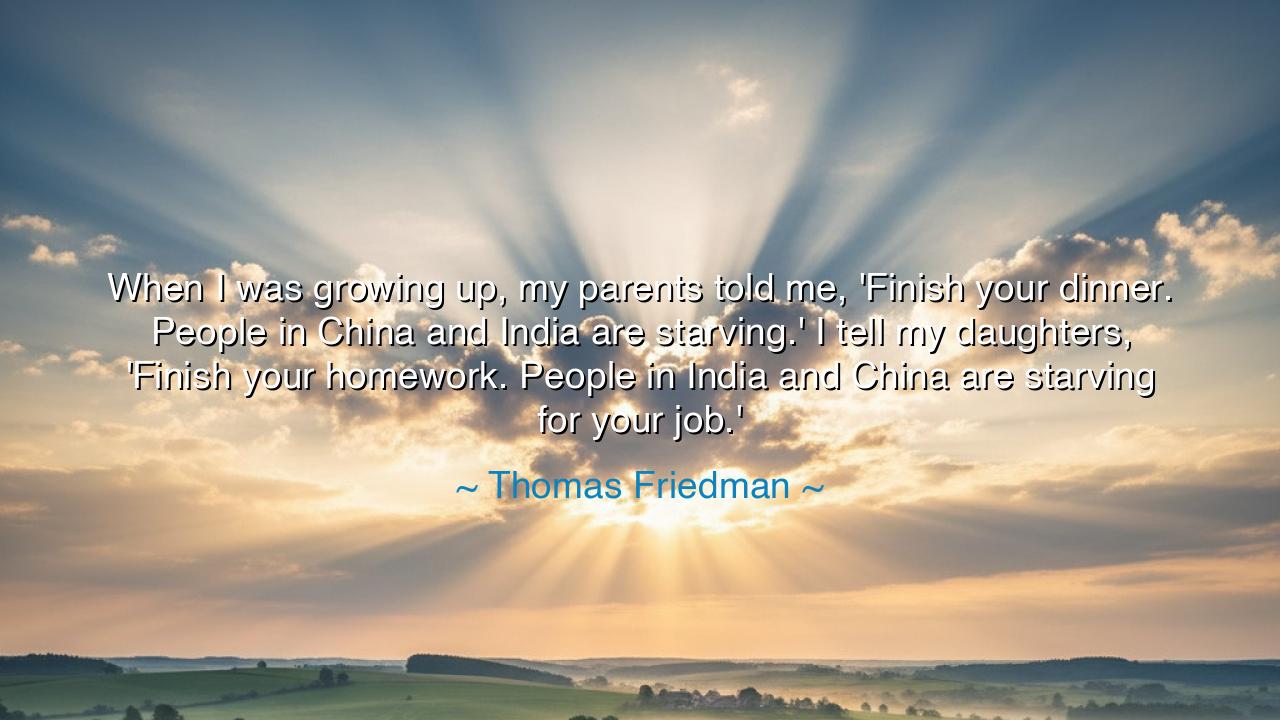
When I was growing up, my parents told me, 'Finish your dinner.
When I was growing up, my parents told me, 'Finish your dinner. People in China and India are starving.' I tell my daughters, 'Finish your homework. People in India and China are starving for your job.'






Thomas Friedman once spoke with piercing clarity: “When I was growing up, my parents told me, ‘Finish your dinner. People in China and India are starving.’ I tell my daughters, ‘Finish your homework. People in India and China are starving for your job.’” At first glance, this is a shift from one parental admonition to another, yet within it lies a profound meditation on the changing tides of the world. For once the greatest concern was the scarcity of bread; now it is the scarcity of opportunity. The cry of hunger has not disappeared, but it has transformed, revealing how the struggles of distant lands are bound to the futures of our children.
In the days of Friedman’s youth, parents often reminded their children of the hungry abroad to stir gratitude and humility. To waste food was to mock those who had none. This teaching, though simple, was rooted in an ancient moral truth: that one’s blessings are never to be taken for granted. But as the world shifted, as economies grew, as nations like India and China surged forward with energy and ambition, the parable of hunger itself evolved. The empty stomach became the symbol of a past struggle; the empty desk, the neglected book, became the battlefield of the future.
For now, in the modern age, nations once thought poor rise as giants. Their children labor over mathematics and science, their students strive relentlessly, their workers seize every chance to climb upward. The global arena has become a contest not of armies, but of minds. To fall behind in study, to neglect one’s homework, is to surrender silently in a war of ideas and skills. The famine of our age is not only for food—it is for knowledge, for opportunity, for advancement.
History gives us lessons in this truth. Japan, after the devastation of World War II, poured its strength into education, discipline, and innovation. Within a generation, a nation that had been reduced to ashes stood as a titan of technology and industry. In like manner, South Korea, once impoverished, transformed itself through relentless investment in its students and schools. These stories reveal that the hunger for knowledge is more powerful than hunger for bread alone, for it sustains not merely the body but the destiny of nations.
Friedman’s words carry also a warning. To the youth of prosperous lands: do not grow idle in comfort. While you recline in plenty, somewhere else a young soul burns with ambition, studying by candlelight, determined to seize tomorrow. If you squander your chance, that soul will take your place. Thus, education is not a burden but a weapon, a shield, a path to survival and honor in a world where competition is fierce and borders are no longer barriers.
The lesson for all is this: gratitude must be joined with diligence. Just as children of the past were taught to honor food by not wasting it, so must today’s children honor their opportunities by not neglecting them. To waste knowledge is worse than to waste bread, for the loaf feeds only a day, but the lesson feeds a lifetime. Finish your meals, yes—but above all, finish your homework, for the world waits for no one, and the future belongs to those who prepare.
Practical counsel may be given. Parents, teach your children the dignity of labor not only in the field or kitchen, but also in the classroom. Youth, embrace study as a sacred duty, not merely for yourself but for those who depend on your future strength. Citizens, honor and invest in schools, for they are the fortresses of tomorrow. And never forget that comfort can be as dangerous as poverty if it lulls the spirit into complacency.
Thus, Friedman’s saying is both a mirror and a prophecy. “Finish your homework. People in India and China are starving for your job.” It reminds us that the struggles of the world are ever-shifting, that survival requires adaptation, and that knowledge is the true bread of the modern age. Let the youth, therefore, rise each day not in fear, but in resolve—to learn, to labor, to grow—for in their diligence lies the fate not only of themselves, but of nations yet to come.






AAdministratorAdministrator
Welcome, honored guests. Please leave a comment, we will respond soon